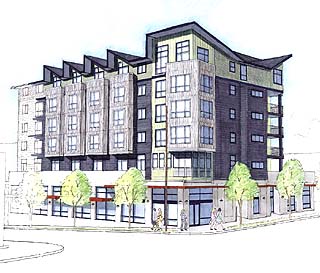
Surveys
DJC.COM
December 9, 2004
Low-income housing goes green
Low Income Housing Group

Sketch courtesy Runberg Architectural Group
Denny Park Apartments in South Lake Union will meet green building standards.
|
As the city of Seattle promotes new development in South Lake Union and biotech companies eye space just north of downtown, the Low Income Housing Institute is focused on expanding affordable housing in that area.
Construction just started on the Denny Park Apartments at 230 Eighth Ave. N. The project will have 50 apartments over street-level commercial space. Units range from studios to three-bedroom apartments and are targeted to families and individuals with incomes under 60 percent of the area median who work in downtown and South Lake Union.
"The city of Seattle recognizes the critical need to link affordable housing with employment growth in South Lake Union. We must ensure that lower wage workers can afford to live near where they work," said Seattle City Council President Jan Drago. The city's Office of Housing provided just over $2.1 million in financing to LIHI for the Denny Park Apartments.
First in the nation
Not only will new residents benefit from safe, attractive and affordable housing, the building will be environmentally friendly. Denny Park Apartments is the first project nationally to receive funding under the new Green Communities Initiative, a five-year, $550 million commitment to build more than 8,500 environmentally friendly affordable homes across the country.
"Too many Americans live in unhealthy, inefficient and poorly sited housing that hinders them from reaching their full potential," said Bart Harvey, chairman and CEO of The Enterprise Foundation and chairman of ESIC.
The Green Communities Initiative is a partnership of The Enterprise Foundation, Enterprise Social Investment Corporation (ESIC) and the National Resources Defense Council. The initiative offers incentives to developers for affordable rental and for-sale housing that promotes health, conserves energy and natural resources, and provides easy access to jobs, schools and services.
Incentives include favorably priced financing, tax credit investments, grants and technical assistance.
"We have long believed that smart, sustainable building practices can be brought to bear in providing housing to the neediest in our society," said Melinda Nichols, LIHI board president. "The costs to build green affordable homes are very manageable, and are more than offset by the benefits.
"Furthermore, low-income families and individuals with special needs stand to gain the most from living in homes that are healthy, efficient and connected to opportunities and services. Green Communities homes will be community assets into the future. We encourage grassroots developers everywhere to join with us in participating in Green Communities."
Some of the other partners and supporters of the initiative include the U.S. Green Building Council, National Center for Healthy Housing, the American Institute of Architects, the American Planning Association, Fannie Mae, Freddie Mac, JPMorgan Chase, Washington Mutual, Blue Moon Fund, The Home Depot Foundation, The Kresge Foundation and others.
Sustainable design
Designed by Runberg Architectural Group and constructed by The Rafn Co., the Denny Park Apartments will include many sustainable design features:
- All storm water is being collected and used to irrigate the landscaping.
- An abundant use of daylight reduces reliance on artificial light, lowering electrical demands.
- Low VOC materials and continuously running exhaust fans help ensure good indoor air quality.
- The orientation of the building along an east-west axis allows for maximum solar exposure.
All together, the project is satisfying 159 different items on the Seattle BuiltGreen Certification Checklist for sustainable design.
Project financing
| Break some ground |
|
The Low Income Housing Institute is holding a groundbreaking ceremony at 10 a.m. on Dec. 16 at the Denny Park Apartments site: 230 Eighth Ave. N. in South Lake Union.
|
The total development cost for Denny Park Apartments is $10.7 million with $5.5 million in tax credit investment provided by ESIC and its partners — US Bank, Freddie Mac and JPMorgan Chase. Additional financing is coming from: the state Department of Community, Trade and Economic Development; the Seattle Office of Housing; Federal Home Loan Bank; the state Housing Finance Commission; Washington Community Reinvestment Association; Bill & Melinda Gates Foundation's Sound Families Program; Wells Fargo; Channel Foundation; Seattle Housing Authority and The Enterprise Foundation.
In the South Lake Union neighborhood, LIHI also owns the 30-unit Jensen Block Apartments and the 59-unit Lakeview Apartments. With an emphasis on quality design and construction, LIHI has been successful in bringing innovative housing to a variety of neighborhoods.
Sharon Lee is the founding executive director of LIHI, a nonprofit group that has developed over 2,600 affordable units throughout the Puget Sound region since 1991.
Other Stories:
- CBA's Insights program turns eight years old
- Soggy building? Better check your insurance
- Real estate's important role in mass transit
- Sleepy Spokane awakes to a real estate renaissance
- Let's go downtown — Bellevue, that is
- Seattle's goal: create community, not crowds
- How mixed-use can save commercial districts
- Seattle's land code needs a diet
- Does your landlord have too much control?
- Alderwood gets urbanized and upscaled
- For Eastsiders, it's been the best recession ever
- Owners' reps keep a lid on project costs
- Downtown Seattle office market: Is less worth more?
- Eli Khouri
- Patrick Callahan
- Matthew J. Griffin
- Don Milliken
- Frank Stagen
- Seattle's waterfront can be an amenity for the region
Copyright ©2009 Seattle Daily Journal and DJC.COM.
Comments? Questions? Contact us.